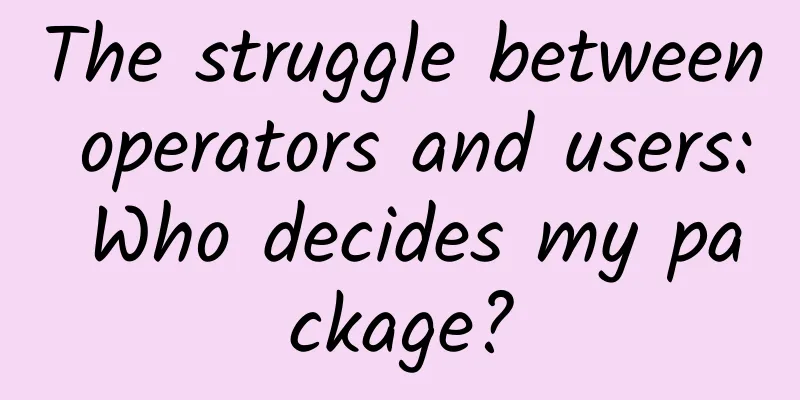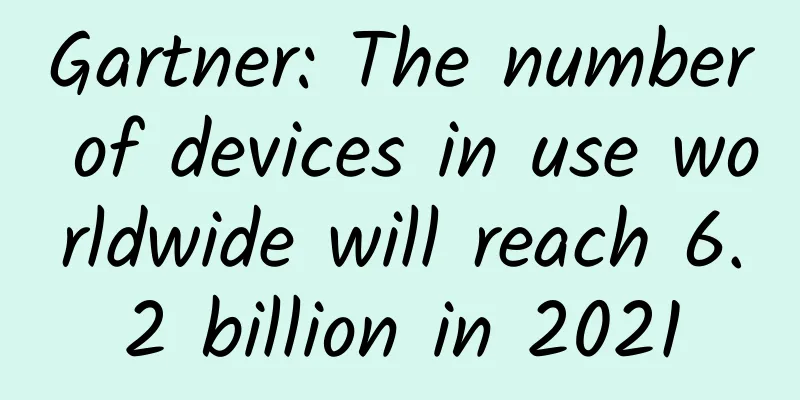The struggle between operators and users: Who decides my package?

|
What service do you like the most? The most likely answer is China Mobile's signal, China Unicom's traffic and China Telecom's broadband. As the saying goes, you can't have your cake and eat it too. When choosing a package, some consumers don't want to have too high a rate or not have enough traffic. After a long struggle, they choose a "makeshift" package. As a result, when the accumulated fee is higher than the rate of a higher-level package, they feel very upset. Therefore, some people think it would be great if they could define the package services they want. Don’t be in a hurry, let’s first take a look at the general process of operators formulating packages. Operators need to consider many factors in the package customization process. They need to measure network load and user demand, and also need to make a trade-off between user price acceptance and user value stability. In addition, operators must also meet the needs of customers at different levels (price-sensitive customers, customers with high traffic demand, customers with high voice demand, etc.), and set different package contents according to these needs. For example, in the current traffic era, unlimited traffic usage has become the biggest demand of users. For this reason, operators can only adjust their strategies according to current user needs and then launch the best packages to win user loyalty. Of course, operators must also benchmark against competing products on the market to ensure the competitiveness of their products. Generally speaking, operators launch various packages first, and then customers choose the products that suit their needs. Wouldn't it be great if the opposite were true, allowing customers to customize their own packages within a feasible range? However, reality seems to be a slap in the face. User-defined packages are not popular Operators once launched a user-defined package based on voice needs, but with the advent of the information flow era, users' demand for voice has dropped sharply, resulting in the development of this package becoming increasingly poor. Some operators have even removed such products from their official websites. The main reason is that current users want to get low-cost and high-traffic services, but the service content of the old custom packages is not as practical as the new packages, and the high fees of the old packages exceed user expectations. For example, in the mobile 4G self-selected package, traffic and voice are mandatory packages, and data services are optional packages, which means that the maximum consumption is 38 yuan (including 300M domestic traffic + 50 minutes of domestic outgoing calls), but the 4G Feixiang package 38 yuan level includes 300M domestic traffic + 50 minutes of domestic voice + 1032M free time traffic, which has obvious advantages in traffic. For users who travel frequently, if the average monthly 5G traffic plus 1000 minutes of calls, the maximum tariff of the self-selected package will be 348 yuan (180 yuan 6G domestic traffic + 168 yuan 1000 minutes); if you choose the newly launched unlimited package, the maximum tariff is only 238 yuan = 5G domestic calls + 1200 minutes. In contrast, the tariff of the newly launched unlimited package is more favorable. Comparing the contents of the customized packages of China Unicom and China Telecom, we can see that, whether it is China Unicom's 4G combination package or China Telecom's customized package, under the impact of the further upgrade and optimization of unlimited products, daily rental cards and Internet cards, the number of new network users is very small. In the current traffic era, chat tools such as WeChat and QQ have gradually replaced voice, which has also led to a shift in user demand from more voice and low traffic to less voice and high traffic. For example, China Unicom's newly launched China Life Card 19 yuan package includes 2GB of national traffic + 150 minutes of talk time, and 39 yuan package includes 5GB of national traffic + 200 minutes of talk time, domestic voice 0.1 yuan/minute, short/MMS 0.1 yuan/minute, and 10 yuan/GB of traffic outside the package, which is enough to kill the self-selected packages with the same voice and traffic. Is there any self-selected custom package available? Some people say that the combination packages launched by operators are customized packages. Does that mean that as user needs continue to change, users have a wider range of rights to define their own packages? Here we need to make it clear that users cannot customize a package at will. The so-called customization must be done within the scope of the operator's permission. Under this premise, this method is theoretically feasible. However, there are still difficulties in actual operation: Difficulty 1: It is difficult to sort out and settle the packages Different from customized products in other industries on the market, my country has a large population, and if each user defines his or her own package, there will be thousands or even hundreds of millions of packages. However, operators have limited manpower, and it is still unknown how much time and effort it will take to understand the package content of users. In addition, as user usage behavior continues to change, some users may change their packages multiple times, and the subsequent work will become very difficult. Operators may be unable to do the job. Difficulty 2: Improper operation is prone to user complaints and high maintenance costs Assuming that user-defined packages are really implemented one day, as user usage behavior and the current network information environment change, users are likely to frequently change packages. At this time, when the operator does not have time to update the package and charges by mistake or undercharges, it is easy to cause user complaints and reduce operating profits. Frequent changes in packages by users will also cause great trouble to the operator's maintenance work. Therefore, from the user's perspective, of course, they want to customize their own packages according to their usage and reduce additional charges. However, from the operator's perspective, this operation is too difficult, and the cost is not proportional to the income, so the right to choose for users will naturally not be that high. Understand what users really want It is not easy for an individual to completely customize their own operator package, and the possibility of achieving it is indeed small. Therefore, in fact, current users hope that operators will not ignore the rights of old users when launching new offers, and do not let operators open up the processing rights after continuous complaints and mediation by the Ministry of Industry and Information Technology, as in the past, when mobile users could not choose to keep their numbers for 8 yuan and old Unicom users could not switch to Internet card packages. User demand is the driving force for operators to upgrade and optimize. Before launching new products, operators may wish to conduct questionnaire surveys to gain an in-depth understanding of the services users currently want and what services they want in the future, and formulate packages that are more suitable for the public based on demand, or upgrade existing products based on survey results to further improve the competitive advantage of products and retain old users. Users want to control every penny they spend and get their own services to a greater extent, while operators want to provide services within their capabilities without losing money. Therefore, the game between users and operators will not stop because of whether they have a customized package with greater authority. New problems and contradictions will continue to emerge, and new solutions and methods will also come into being. It can be seen that only when operators truly meet the needs of customers can a win-win situation emerge. |
<<: [Hotspot] ZTE was fined $1 billion but escaped death. Review of the whole ZTE incident
>>: Operators are making full use of 4G, so what about 5G?
Recommend
Wi-Fi 6 applications are in sight, which may trigger another wave of IoT development
Wi-Fi currently sends signals on the 2.4 and 5GHz...
MEC – Are we getting closer?!
Multi-access edge computing (MEC) or previously m...
F5 Greater China Chief Technology Officer Wu Jingtao: Probeless real-time application big data collection engine implementation and AIOps realization
[51CTO.com original article] Recently, the WOT201...
Six big pitfalls encountered when calling third-party interfaces
I believe everyone has felt the current market si...
Let’s talk seriously about what is a fiber optic terminal box?
When it comes to network cabling, outdoor connect...
Tencent Cloud Light 1C2G3M annual payment 83 yuan, Hong Kong Light 1C1G30M annual payment 298 yuan, new and old users are welcome
Tencent Cloud's Double Eleven event is still ...
Apple, Qualcomm, and Intel: 5G
Within 48 hours, Apple, Qualcomm, and Intel, thre...
LOCVPS 20% off, Japan/Singapore/Russia CN2/Korea CN2/Hong Kong CN2/US CN2 etc. monthly payment starts from 29.6 yuan
LOCVPS is a long-established Chinese hosting comp...
Deny 5G and believe in Starlink? IQ is a good thing
Not long ago, a foreign artist "made" a...
Can the Internet of Things drive the deployment of IPv6?
IPv6 has features that IPv4 lacks, which makes it...
edgeNAT VPS 20% off for monthly payment and 30% off for annual payment, Hong Kong/Korea/US data centers available, top up 500 yuan and get 100 yuan free
edgeNAT has just launched a promotion for this mo...
Mathematical formula could help 5G networks share communication frequencies efficiently
Researchers at the National Institute of Standard...
RAKsmart San Jose servers start from $30, Japan/US servers 100M-10Gbps bandwidth high-defense servers, cluster servers
RAKsmart launched this year's Double 11 promo...
Still don’t understand routing strategy? Let’s analyze it!
For IP network engineers, the deployment of routi...
UUUVPS newly launched Los Angeles AS9929 line VPS with 15% discount, native IP monthly payment starts from 33 yuan
UUUVPS (Sanyou Cloud) has newly launched the AS99...









